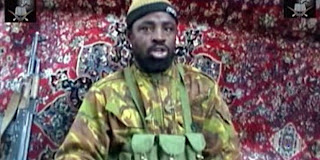I Enjoy Killing Anyone God Asks Me to Kill the Way I Enjoy Killing Rams-Shekau

LAGOS, Nigeria — Last month, we Nigerians received some startling news from the army: Abubakar Shekau, the leader of the militant Islamist group Boko Haram, which has killed some 3,000 people in northern Nigeria over the last four years, “might have died.”
The government has provided no proof of this claim. No corpse has been displayed, and Boko Haram, whose name loosely translates as “Western education is sinful,” has been silent on the matter. Just a few days ago, Boko Haram militants set up a roadblock in the northern town of Benisheik and shot at least 87 people to death as they were trying to flee.
This would not be the first time we had heard false rumors of his death — there was one in 2009 — and many Nigerians believe the announcement was merely a ruse, designed to provoke Mr. Shekau into making a public appearance or statement, in the hope of flushing him out. The theory is not so crazy: Boko Haram released a video a few days before the August announcement that purported to show Mr. Shekau, but the government said the man in the video was “an impostor.”
Given that the United States has placed a $7 million bounty on his head — a figure that puts him well up there in the terrorists’ league — there is plenty of incentive to get hold of Mr. Shekau, especially for soldiers in the three states in northern Nigeria where the sect is believed to be holding out, and where a state of emergency was declared a few months ago.
Little is actually known about Mr. Shekau, except for his taste for killing. In a rare video clip released early last year, he said, “I enjoy killing anyone that God commands me to kill — the way I enjoy killing chickens and rams.”
Mr. Shekau’s ascent to power — and the concomitant increase in violence — followed the extrajudicial execution of the sect’s founder, Mohammed Yusuf, by the police in 2009. This singular event, which was also videotaped, gave Mr. Shekau the excuse he needed to start bombing churches and schools in what quickly became a reign of terror. But the virulence of his murderous campaign points to a much deeper problem: the power struggle between the largely Islamic north and the largely Christian south.
From independence in 1960 until the return of democracy in 1999, Nigeria was ruled almost exclusively by elites (largely military) from the north, who practically believed that they had a divine right to govern. By 1999, the elite accepted that its monopoly on power was no longer feasible, and allowed a southerner of its choosing, Olusegun Obasanjo, to emerge as president for two four-year terms, on the understanding that the presidency would return to the north afterward.
A northerner, Umaru Yar’Adua, indeed took over in 2007, but he died in office nearly three years later, and was succeeded by his deputy, Goodluck Jonathan, a southerner, who was supposed to act as a caretaker but then decided to run in 2011. He initially promised to serve just one full term, but has now reneged and talks about pursuing a second term in the next election, in 2015.
Why does this regional struggle matter? It’s partly a curse of the bonanza of crude oil in the south, the control of which is the raison d’être of our government. As one northern ruler put it during the oil-price rises of the 1970s, Nigeria’s problem is not money, but how to spend it.
Decades later, Nigeria — the world’s seventh most populous country — is the world’s second-largest importer of Champagne but is unable to deliver more than a few hours of electricity a day.
The southerners who inhabit the oil-producing Niger Delta, which financed the northern elite’s decades-long party, have awakened to the theft of their resources and started demanding greater political representation. Some have purloined their region’s crude wealth to buy military hardware on the high seas. Unlike Boko Haram, however, these militants are mostly focused on securing autonomy for the delta, not on imposing a radical religious ideology.
By the time Boko Haram started its own, far more ferocious, brand of violence four years ago, the case for a continued northern monopoly on power seemed lost. That’s why some Nigerians believe that the northern elite quietly tolerated — or even abetted — the sect, as a way to bog down Mr. Jonathan’s government, and to preserve the privileges of political patronage by keeping resources flowing to the north.
Mr. Jonathan himself has accused some leading northern politicians of consorting with Boko Haram. Muhammadu Buhari, a northern leader, former military officer and frequent presidential candidate, who plans to run again in 2015, has declined to condemn the terrorist group and has accused the government of hypocrisy. Niger Delta militants “were given money, and a training scheme was introduced for their members,” he said, while in contrast, “when Boko Haram emerged, members of the sect were killed.”
This is a ludicrous comparison, but a sad measure of the gulf between the two sides fighting for the soul of this country.
The problem goes beyond Boko Haram, which in any case appears to be splitting into several splinter groups, some expanding their reach beyond Nigeria. It may have been just such a splinter group that kidnapped members of a French family over the border in Cameroon in February and held them for two months.
As the latest deadly attacks in the north show, it hardly matters whether Mr. Shekau is dead or not. The killings continue, which is why the state of emergency is unlikely to end anytime soon.
Adewale Maja-Pearce is the author of “A Peculiar Tragedy: J. P. Clark-Bekederemo and the Beginning of Modern Nigerian Literature in English.”

Comments
Post a Comment